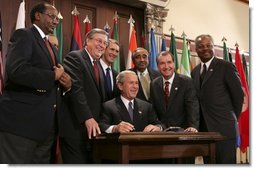The Saharan region of Africa is still struggling to get a strong foot hold in the global arena. But with the aid of the African Growth and Opportunity Act (AGOA), opportunities would be showing a silver lining.
The AGOA Act was approved by the U.S. Congress to assist the Sub Saharan economies and augment relations between the concerned region and the US. Under the administration of Presidents George W. Bush and William J. Clinton, Rosa Whitaker developed and implemented the African Growth and Opportunity Act (AGOA). Currently 39 African countries benefit by the AGOA Act.
AGOA is a trade preference program providing duty-free access to the U.S. market for products exported from 39 countries in the sub-Saharan Africa.
AGOA amends the U.S. Generalized System of Preferences (GSP) by expanding its product coverage of about 4,650 products by 1,800 additional tariff lines, including apparel, certain textiles such as bed sheets, towels etc.; ethnic printed fabrics, and handmade, hand loomed and folklore articles and extending duty-free treatment for eligible sub-Saharan African countries until 2015. The act provides stable, for regional exporters, offering them long-term access to the U.S. market than they enjoyed under the existing GSP program, which applies to developing countries around the world. The act also provides technical assistance to African producers to comply with the US standards.
Expiry of Quotas-Do they affect the AGOA countries?
Expiry of the quota system induced competition among the textile and apparel sectors of countries; globally. As per the WTO predictions, substantial transformation in the textile and apparel trade was anticipated in Asian countries particularly China, which was predicted by industry experts to increase their share in the US market with the removal of quotas. Proving it right, the Chinese share of apparel exports to US regarding products such as cotton trousers soared dramatically during 2005. Many apparel makers of the AGOA beneficiary countries new to the global apparel business were concerned by this.
Will Competition hurt the African Exporters?
Some industry analysts state that intense competition would force some of the AGOA exporters out of the business arena. Some of the factories in Africa were also shut down proving this fact. However, the tariff advantages of AGOA aided the producers to remain competitive and retain their market share regarding certain apparel products. Apart from this, many African countries need assistance in utilizing the opportunities provided by the act. Either because of lack of proper awareness, or inadequate infrastructure, and lack of adequate experience in producing and marketing value added products for the US market. To sustain their market share, the producers need to find ways to reduce their high costs thereby churning out more profits.
AGOA enables opportunities proving determinant for a country’s success. It helps in creating more jobs related to apparel manufacturing. The AGOA offers a promising growth for African products in the US market.
